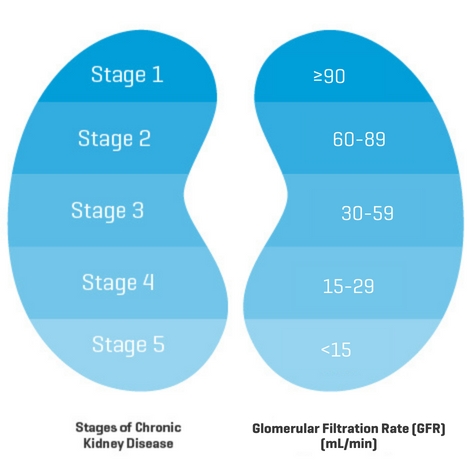Stage 5 Chronic Kidney Disease (CKD)
What is Stage 5 CKD?
Stage 5 CKD means your kidneys have failed or lost most of their ability to filter waste and fluids from the blood. It is the most severe stage of CKD, also known as kidney failure, end-stage renal disease (ESRD), or end-stage kidney disease (ESRD).
Overview of stage 5 chronic kidney disease

Chronic Kidney Disease (CKD) is divided into five stages based on kidney function and whether there are signs of blood or protein in the urine.
Patients with stage 5 CKD have a glomerular filtration rate (eGFR) of less than 15ml/min for three months or more. This means their kidneys are working less than 15% of their function. The patient’s kidneys are not able to maintain fluid balance resulting in higher build-up of toxins and salts and patients will need dialysis or a kidney transplant to survive.
Many patients living with stage 5 CKD also experiences other health issues related to kidney disease, such as anaemia and metabolic bone disease.
At stage 5 CKD, you should have made decisions and plans regarding kidney replacement therapy, such as dialysis. Some patients gradually progress to stage 5 CKD and are well-informed about the available treatment options. Unfortunately, for some patients, CKD is only discovered at stage 5 and needs quick action from the nephrology team.
Signs & Symptoms of stage 5 chronic kidney disease (CKD)
Here are some common symptoms of stage 5 CKD:
- Fatigue
- Shortness of breath
- Swelling in your hands and feet
- Puffy eyes
- Change in urine colour or volume
- Muscle cramps
- Loss of appetite
- Nausea and bad taste in the mouth
- Trouble sleeping
- Itch
- Discolouration of nails and skin
Learn more about the different kidney disease symptoms you may experience and why.
Although symptoms may be more prominent at stage 5, symptoms of CKD are mostly non-specific in nature, so it is important to be aware of the symptoms you are experiencing and to inform your doctors and nephrology team of any new or worsening symptoms, especially fatigue and loss of appetite.
Diagnosis at stage 5 chronic kidney disease (CKD)

The diagnosis of CKD is done through blood and urine tests. The tests are performed to diagnose the stage of CKD by determining the estimated glomerular filtration rate (eGFR) and protein content in urine, which gives an indication of your kidney function. In Stage 5 CKD, the eGFR is less than 15 ml/min.
Once the diagnosis of stage 5 CKD is confirmed, you will need to urgently see a kidney specialist, also known as a nephrologist, to assess the underlying kidney problem and to develop a treatment plan.
This can be an extremely stressful and anxious time as there are pros and cons to different treatment options, and it is important to gather all the information before developing a treatment plan that is right for you. Find out important questions to ask when meeting your nephrologist to make an informed decision about your kidney disease treatment.
Treatment options for stage 5 chronic kidney disease (CKD)

There are two treatments for kidney failure: dialysis and kidney transplant. You may also choose not to pursue either treatment option, also known as conservative care. As stage 5 CKD is irreversible, the main goal of treatment is to slow or halt the progression of the disease.
Your nephrology team will work with you to develop a treatment plan suited to you. This plan will include a range of medications to not only help with kidney function but also to manage your symptoms or health issues caused by kidney disease.
What can I expect as a stage 5 CKD patient in Singapore?
- You will be evaluated through laboratory tests, radiographic and ultrasound scans and, where appropriate, real-time ultrasound-guided kidney biopsy. You will also be evaluated for the cause of kidney failure and the prognosis to provide holistic management of the disease.1
- You will receive counselling on the available treatment options for stage 5 CKD from your healthcare team as well as medical and dietary therapy to slow the progression of the disease.
- Your healthcare team will work with you to develop a treatment plan and guide you on the next steps.
Managing stage 5 chronic kidney disease (CKD)

Proper chronic kidney disease (CKD) management is vital to improving your quality of life with stage 5 CKD. Therefore, you should maintain a regular exercise routine and follow the recommended diet. You should also stop smoking and monitor your other health conditions. At stage 5 CKD, you will need to visit hospitals frequently to monitor your kidney condition. You should also be starting your kidney replacement therapy when needed, either dialysis or kidney transplant, depending on the treatment plan developed by you and your nephrologist.
When is kidney replacement therapy started?
Your nephrologist will assess the best time to start dialysis based on your symptoms and blood test results. There is no hard and fast rule regarding when you should start dialysis. The treatment should be tailored based on your lifestyle and life goals.
People diagnosed with stage 5 chronic kidney disease (CKD) will need quick clinical assessments and may need to start urgently on dialysis.

The prognosis for stage 5 chronic kidney disease
Talking to your nephrologist about your short-term and long-term challenges and goals is important. Your CKD treatment plan should be personalised based on your challenges and goals. This can be a challenging time for you and your loved ones, and it is, therefore, important to get all the help and information you need as you start dialysis.